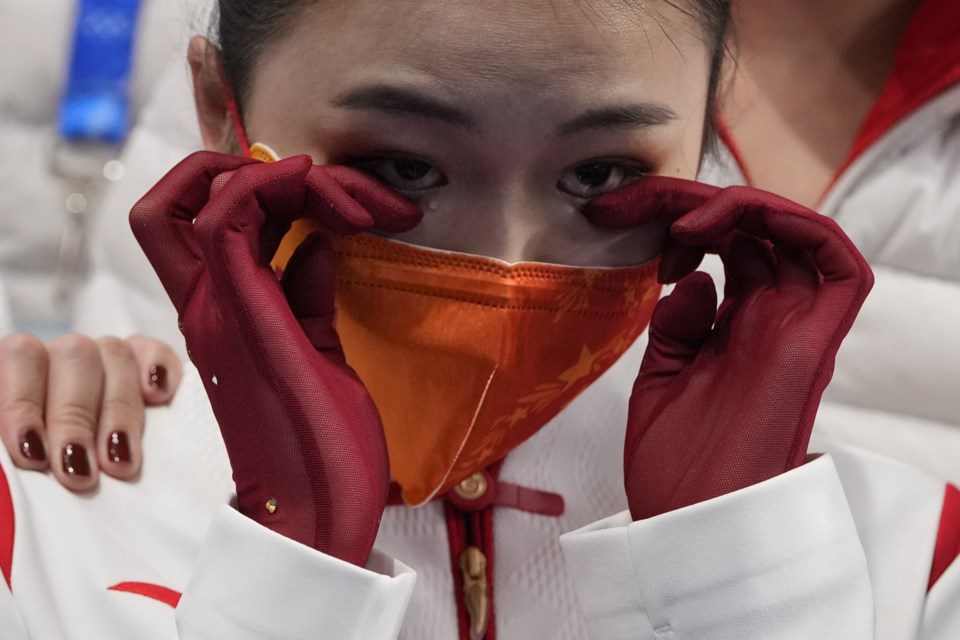BEIJING (AP) ŌĆö NHL great Chris Chelios' son is playing for China at the Olympics, though you won't see the Chelios name on the roster.
Like other foreign-born athletes representing China at the Beijing Games, Jake Chelios will play under a Chinese name. In any official Olympic context, he will be Jieke Kailiaosi.
"My new name? I love it. ItŌĆÖs cool. ItŌĆÖs part of the experience. Since IŌĆÖve been over here, everythingŌĆÖs kind of new for me, and thatŌĆÖs the exciting part about playing overseas," Chelios said at Saturday's practice. "I know two or three words (in Chinese), but I took six years of Spanish in high school. I couldnŌĆÖt even learn that, so I didnŌĆÖt even try.ŌĆØ
China is eager to popularize winter sports and to be represented across the Olympic program, even in events where it hasn't had much success in the past. In hockey, freestyle skiing and figure skating, China has athletes who were born and raised in North America.
The naturalized athletes come from a variety of origins. Unlike Chelios, many of them have Chinese heritage and see the 2022 Games as a way to strengthen a connection to their family origins. The most famous is Eileen Gu, on the Olympic program as Gu Ailing, a freestyle skier who has said she chose to represent China because she thought she could have a as a role model.
She made her point on Monday, landing a spectacular 1620 jump to in the big air event.
Vancouver-born goaltender Kimberly Newell is another in the spotlight in China after making five saves in a shootout to earn China a 2-1 win over Japan in women's hockey on Sunday. She's playing as Zhou Jiaying, and explained that Zhou is her mother's family name and Jiaying the Chinese name she was given as a child by her mother.
At the start of a conversation between Newell and English-speaking reporters on Sunday, a team staff member accompanying the goalie said she would only speak Chinese.
ŌĆ£I just want to do my best throughout the whole tournament. Step by step, I do my best,ŌĆØ she said, according to the staff member's translation.
Newell played college hockey for Princeton and also played for the Canadian under-18 national team, making 39 saves in the gold-medal game to beat the United States at the 2013 under-18 world championship.
After two years outside of hockey, Newell was recruited in 2018 to play for the Shenzhen KRS Vanke Rays, a Chinese-owned club which played first in sa╣·╝╩┤½├Į, then the Russian league, and became the basis for the new-look Chinese national team. Beating Japan was a breakthrough for Chinese hockey, which last played at an Olympic tournament in 2010.
Other players have taken different routes to the Chinese teams.
Former NHL goaltender Jeremy Smith ŌĆö who has his new name Jieruimi Shimisi written across his mask in Chinese characters ŌĆö saw a move to China as a way to rejuvenate his career after 10 games with the Colorado Avalanche in 2017 and time with numerous farm teams.
In 2019, he signed with Kunlun Red Star, a Chinese-owned club playing in the Russia-based Kontinental Hockey League, as one of who gave the team an experienced core and mentored Chinese players. Last year, he was asked if he'd consider playing for the Chinese national team, too.
ŌĆ£If anybody were in my shoes, they'd understand how sometimes the pieces just fall into place, and it's a privilege to play hockey for a profession,ŌĆØ Smith said.
His first game for China will be Thursday against the United States, which he represented at the 2008 world junior championships.
ŌĆ£It's pretty unique," Smith said. "Not many people can say they have played for and against USA.ŌĆØ
Many countries across a multitude of sports have fielded naturalized athletes for decades. Russia won three Olympic gold medals with South Korea-born speedskater Viktor Ahn in 2014, and naturalized athletes from the United States, sa╣·╝╩┤½├Į, Russia and Germany.
China took longer to embrace the idea, in part because of its strict rules on citizenship. Chinese ethnic heritage or long-term residence are typically required, and new citizens must renounce other nationalities. It's not clear if exemptions have been made for these Olympians, or if any still hold other passports.
Competing as a naturalized athlete for a country of 1.4 billion people can be overwhelming.
Figure skater Zhu Yi, who was born in California to Chinese parents and won a U.S. national novice title as Beverly Zhu, was criticized on Chinese social media after falling repeatedly in the team event and finished her skate Monday in tears. Some in the United States expressed glee at her falls because of her change of sporting allegiance.
ŌĆ£I am relieved because (there is) a lot of pressure and people are expecting a lot," Zhu said Monday. ŌĆ£Honestly, IŌĆÖve trained really hard and I think the main thing is coping mentally."
___
AP Hockey Writer Stephen Whyno contributed to this report.
___
More AP Olympics: https://apnews.com/hub/winter-olympics and https://twitter.com/AP_Sports
James Ellingworth, The Associated Press

